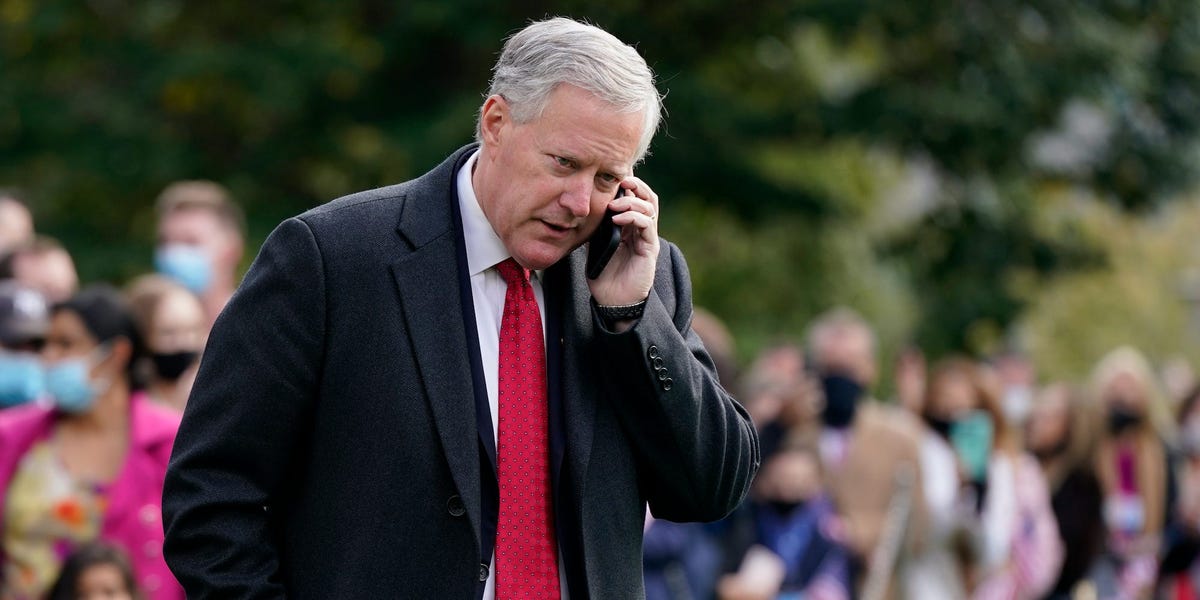Mark Meadows pushed conspiracry theory on Chinese thermostat election hacking: report

- Mark Meadows pushed a conspiracy theory that China used thermostats to hack into voting machines.
- A new CNN report reveals more details about Meadows’ efforts to subvert the 2020 election.
- Meadows pressured federal agencies, including the DOJ, to investigate bogus voter fraud claims.
Former White House chief of staff Mark Meadows contacted high-ranking national security officials about a conspiracy theory that China hacked into voting machines with thermostats as part of his efforts to subvert the 2020 election results, CNN reports.
Meadows used his powerful position in the Trump administration to further the former president’s efforts to overturn his 2020 election loss, including pressuring federal agencies to investigate or back up unfounded conspiracy theories, congressional investigations have shown.
CNN reported that Meadows reached out to officials at the FBI, the Pentagon, the National Security Council, and the Office of the Director of National Intelligence, to ask them to look into the groundless Chinese thermostat hacking theory.
That conspiracy theory and others were also being espoused by former President Donald Trump’s lawyer Rudy Giuliani, attorney Sidney Powell, and former National Security Adviser Michael Flynn, two of the most high-profile purveyors of outlandish conspiracy theories about hacking and fraud in the 2020 elections.
“Meadows was perpetually enabling this insane stuff and was too scared to stand up to Trump,” a source who was in several meetings with Meadows with the White House and other agencies told CNN.
The new reporting from CNN adds on to revelations from troves of emails between Meadows and top officials at the Department of Justice obtained by the House Oversight Committee and Senate Judiciary Committee and released during summer 2021.
They show that Meadows, among other things, sent Acting Attorney General Jeff Rosen a link to a YouTube video from a man named Brad Johnson claiming that Italy had also hacked into voting machines with military satellites to steal the election from Trump, a conspiracy theory known as “ItalyGate.”
Rosen forwarded the email to a deputy, Richard Donoghue, who replied: “Pure insanity.”
“I responded that Johnson could call or walk into FBI’s Washington Field Office with any evidence he purports to have,” Rosen later wrote to Donoghue “On a follow up call, I learned that Johnson is working with Rudy Giuliani, who regarded my comments as ‘an insult.’ Asked if I would reconsider, I flatly refused, said I would not be giving any special treatment to Giuliani or any of his ‘witnesses,’ and re-affirmed yet again that I will not talk to Giuliani about any of this.”
Former DOJ official Jeffrey Clark also pushed conspiracy theories among senior officials, documents obtained by the House Oversight Committee show. In a December 28 email, Clark told Rosen and Donoghue: “I would like to have your authorization to get a classified briefing tomorrow from ODNI led by DNI Radcliffe on foreign election interference issues,” adding, “Hackers have evidence (in the public domain) that a Dominion machine accessed the Internet through a smart thermostat with a net connection trail leading back to China. ODNI may have additional classified evidence.”
Meadows also contributed to Trump’s efforts to overturn his 2020 election loss in Georgia. He pressed DOJ officials to investigate various purported election irregularities, the emails show, and participated in the infamous January 2, 2021 phone call where Trump pressured Georgia’s chief election official and his staff to “find” him the 11,780 votes necessary for him to overcome his election loss in the state.
Meadows is set to voluntarily cooperate with the House Select Committee investigating the January 6 insurrection, Committee Chair Rep. Bennie Thompson announced on Tuesday, and is expected to sit for a deposition in the next week.
The former chief of staff discusses his actions and conversations with Trump on January 6 — a key focus of the committee — in his forthcoming book “The Chief’s Chief.” Meadows voluntarily writing about the events in his book undercuts his ability to claim that such conversations and records are protected from the committee’s scrutiny by executive privilege.
“It’s…very possible that by discussing the events of Jan. 6 in his book, if he does that, he’s waiving any claim of privilege. So, it’d be very difficult for him to maintain ‘I can’t speak about events to you, but I can speak about them in my book,’” Rep. Adam Schiff, a member of the Select Committee, told Politico.
In the memoir, obtained by the Guardian, Meadows doubles down on the lie that widespread voter fraud led to the 2020 election being stolen from Trump, characterizing him as “in mourning for the second term he had been unfairly denied.” He also downplays the violence caused by the rioters, who attacked and injured an estimated 1,000 law enforcement officers, as committed by “a handful of fanatics.”


